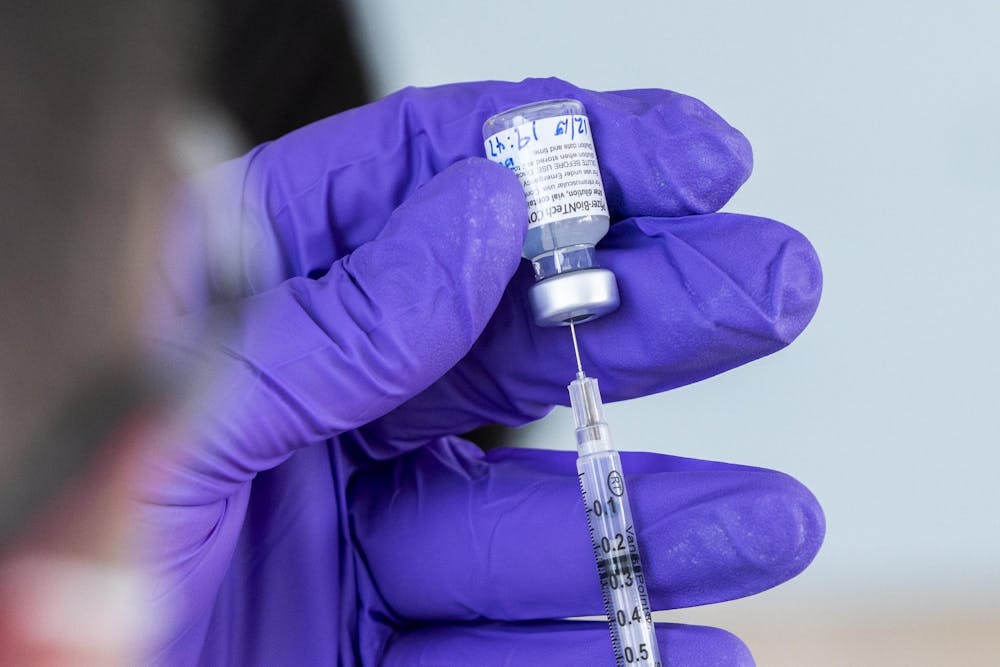Lea en español
As of April 18, adults 16 years of age and older are eligible to receive the COVID-19 vaccine, following an announcement from Governor Northam. This newest update is on par with President Biden’s plan to have all adults in America eligible for vaccination by May 1. To date, 26 percent of the U.S. population has already been vaccinated, and an estimated 70 to 85 percent of the population needs to be vaccinated in order to achieve herd immunity. As several states begin opening eligibility to those 16 and older, students must now decide whether they themselves plan to get the vaccination. Although the University recently opened vaccine appointments to students, the institution should also make vaccinations mandatory. Likewise, they should make a plan to widely distribute vaccines on Grounds, instead of an off-Grounds location where transportation is necessary, in order to increase accessibility for all students. Several colleges around the country have already begun to transform spaces around their campuses into vaccination clinics and or have made vaccinations mandatory to return in the fall.
While students may be split on their motivations for acquiring the vaccine, many at the University are interested — evidenced by the recent flock of students to a former walk-in vaccination clinic in Danville, Va. Some students are motivated by a moral duty to get the vaccine and may see getting vaccinated as essential for the common good. Others are simply eager to return to the “normalcy” of in-person classes, campus events or gatherings with friends. Opinions on whether colleges and universities can or should mandate vaccinations prior to returning in the fall are similarly split. According to a survey of 1,000 college students, 71 percent believe that colleges and universities reserve the right to require vaccinations for students.
However, many students expressed reservations. Around the country, the percentage of students who are apprehensive about the vaccine compared to those who are planning on receiving it is concerning. There are also those who may question the legality of institutions like the University requiring the vaccine. Others will argue that choosing whether or not to get vaccinated is an issue of self-autonomy and that the University has no right to infringe on that. Similarly, some remain concerned about the safety and long-term effects of the vaccine. Students of color may be justifiably concerned about vaccine safety because of the long history of historical medical racism in the country.
These concerns are not created equal, however. In response to the legality of mandating vaccinations, even as a public institution, the University can legally require the vaccine. Some public institutions like Rutgers University have already required vaccinations with certain exemptions as a condition for returning in person next fall. Likewise, the University should also have a medical exception for those who the vaccine could be detrimental to their health, or those with religious exemptions. If mass vaccinations cannot be enforced, the University should require masks in classrooms throughout the fall semester, as some colleges have already mandated.
In response to the issue of self-autonomy, students already agreed to provide documentation of certain immunizations before attending the University. Instead, it can be argued that not getting the vaccine is an infringement on the rights of others, as one’s negligence can pose a significant threat to the life of an immuno-compromised person. Another infringement on the autonomy of others is if unvaccinated students choose to study abroad next school year. These students risk spreading the virus to vulnerable populations where vaccine distributions are slower if non-existent.
Regarding vaccine speed and safety, the vaccines were carefully tested and monitored. The vaccines were similarly the product of worldwide collaboration and significant funding. Although the vaccines were emergency authorized, in such times of urgency, public health officials cannot afford to wait to administer vaccines. Neither should the University when it comes to mandating vaccines. Historically, the key factor behind the decrease in cases of infectious diseases was mass vaccinations. However, continued vaccine hesitancy may prove problematic to the goal of 70 to 85 percent herd immunity.
The University must also address vaccine hesitancy and needs to provide resources such as programming and discussions for students of color and low-income students, so that they can feel safe and informed about the vaccine. Further, many students may live in a rural area where there is not a wide accessibility to the news or resources. This may make spreading information about where to find vaccination clinics difficult. The University should instead become a central hub to acquire a vaccine to accommodate students who face varying accessibility to the vaccine across the country and the world.
Students should not be dismissive when it comes to the virus, and the University must address and provide resources for students of color who have concerns about getting vaccinated. Not having as many younger people vaccinated could create a shift in the virus’ pattern, moving to other age groups. Likewise, even if a person is in good health, their negligence could be the reason it spreads to another vulnerable student. The easing of restrictions and the return to a somewhat normal fall semester does not therefore mean that COVID-19 is no longer a threat. We must continue to be cautious, putting the safety of others above our own desires for entertainment. COVID-19 remains a threat until health professionals and public health officials have deemed conditions can return to normal. The University must do it’s part in stopping the spread of COVID-19 this fall by mandating vaccinations.
Yssis Cano-Santiago is an Opinion Columnist for The Cavalier Daily. She can be reached at opinion@cavalierdaily.com.
The opinions expressed in this column are not necessarily those of The Cavalier Daily. Columns represent the views of the authors alone.







